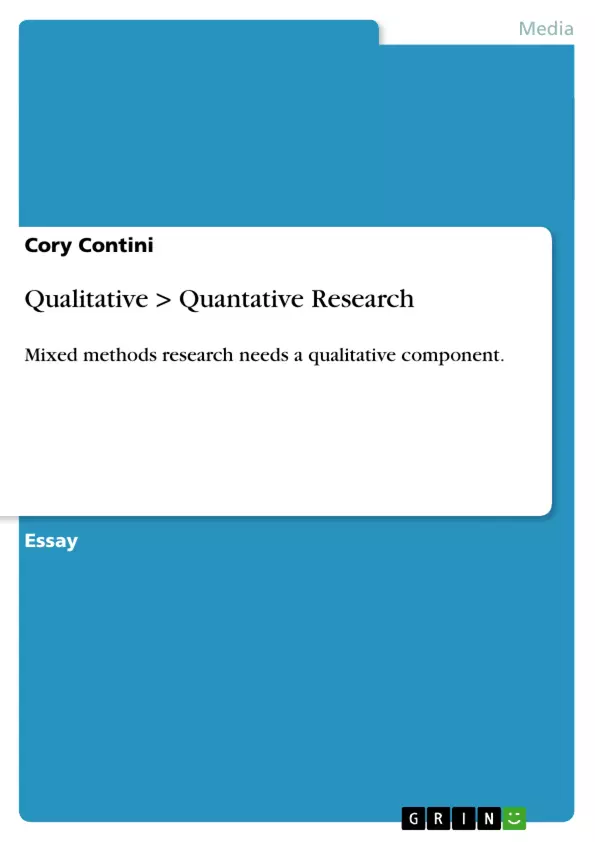This report looks at research methods including the debate between qualitative and quantitative research methodologies, and relates these methodologies to the healthcare field in terms of providing cost effective solutions to healthcare problems like Medicare and other problems. The difference between qualitative and quantitative research approaches is also highlighted in the current report in the relationship between different paradigms of inquiry and definitions of paradigms. The features of logical positivism and phenomenology are therefore also used in approximate relativity to quantitative and qualitative methods, with the assumption being that qualitative methods are more reflective of the subjective approach of phenomenology. However, the report is also open to other definitions of paradigm and category in specific terms of healthcare research topics and new definitions of both types of research approach. “There is no universally accepted definition of qualitative research, because it is a field of enquiry rather than a single entity. Qualitative research is a broad term for a variety of research approaches… 'Qualitative research is an inquiry process of understanding based on distinct methodological traditions of inquiry that explore a social or human problem. The researcher builds a complex, holistic picture, analyses words, reports detailed views of informants, and conducts the study in a natural setting” (Coates, 2004).
Inhaltsverzeichnis (Table of Contents)
- Introduction
- Qualitative and Quantitative Research Methodologies
- Logical Positivism
- Phenomenology
- Managed Care
- Cost Effectiveness in Government Health Programs
- Community Healthcare
- Future Directions in Healthcare Research
Zielsetzung und Themenschwerpunkte (Objectives and Key Themes)
This report explores the relationship between qualitative and quantitative research methodologies, specifically in the context of healthcare cost-effectiveness. It examines the theoretical underpinnings of logical positivism and phenomenology, relating them to the challenges of government health programs like Medicare.- The debate between qualitative and quantitative research methodologies
- The application of these methodologies to the healthcare field
- The cost-effectiveness of government health programs such as Medicare
- The role of managed care in healthcare delivery
- The concept of community healthcare and its implications for research
Zusammenfassung der Kapitel (Chapter Summaries)
The introduction provides a framework for the report, outlining its focus on the relationship between qualitative and quantitative research methodologies and their application to healthcare. It highlights the complexities of the healthcare system, particularly concerning cost-effectiveness in government programs like Medicare. The report emphasizes the importance of understanding the theoretical underpinnings of both logical positivism and phenomenology as they relate to healthcare research.
Subsequent chapters delve into the distinct features of qualitative and quantitative research methodologies. The report explores the conceptual frameworks of logical positivism and phenomenology, highlighting their strengths and weaknesses within the context of healthcare. It examines the role of managed care in healthcare delivery, analyzing its potential impact on cost-effectiveness and access to care. The report concludes by exploring the future directions of healthcare research, emphasizing the need for a comprehensive approach that incorporates both qualitative and quantitative methodologies.
Schlüsselwörter (Keywords)
This report examines the application of both qualitative and quantitative research methodologies to the healthcare field, focusing on cost-effectiveness in government health programs such as Medicare. It explores the theoretical frameworks of logical positivism and phenomenology, examining their strengths and weaknesses in addressing healthcare challenges. The report also delves into the role of managed care and community healthcare within the broader context of healthcare delivery.Frequently Asked Questions
What is the central debate addressed in this report?
The report explores the ongoing debate between qualitative and quantitative research methodologies and their application in the healthcare sector.
How are logical positivism and phenomenology related to research?
Logical positivism is typically associated with quantitative methods, while phenomenology reflects the subjective, inquiry-based approach of qualitative research.
What role does cost-effectiveness play in this healthcare research?
The report examines how these methodologies help find cost-effective solutions for large-scale government programs like Medicare.
How is qualitative research defined in the text?
It is described as an inquiry process focused on understanding social or human problems by building a complex, holistic picture using words and informant reports.
What are the future directions suggested for healthcare research?
The report emphasizes a comprehensive approach that integrates both qualitative and quantitative methodologies to better address complex community healthcare needs.
- Quote paper
- Cory Contini (Author), 2009, Qualitative > Quantative Research, Munich, GRIN Verlag, https://www.grin.com/document/230614



